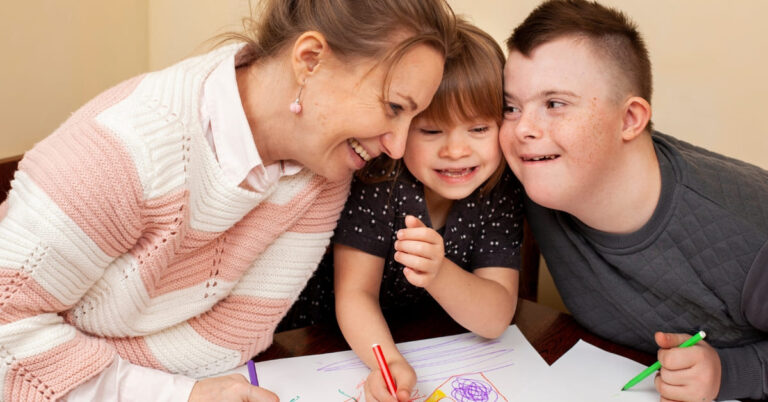Every child has their own unique way of learning, growing, and adapting to the world around them. While many children face occasional academic or social challenges, some struggles surpass developmental milestones.
If your child consistently finds it difficult to keep up with schoolwork, social interactions, or daily routines, consider a psychoeducational assessment.
This specialized evaluation helps to identify potential learning disabilities, cognitive strengths and weaknesses, emotional challenges, and behavioral issues that may be affecting your child’s progress.
In this blog, we will explore key signs that indicate your child might benefit from a psychoeducational assessment and how it can be a valuable tool for supporting their growth and well-being.
What is a Psychoeducational Assessment?
Every child learns and grows at their own pace, but sometimes, struggles with schoolwork, behavior, or social interactions go beyond the typical challenges of growing up.
It may be a sign that they need additional support. One effective way to get to the root of these issues is through a psychoeducational assessment.
A psychoeducational assessment is a comprehensive evaluation that examines various aspects of a child’s functioning, including cognitive abilities (IQ), academic skills, memory, attention, emotional well-being, and social behavior.
Conducted by psychologists or educational specialists, these assessments aim to identify specific learning difficulties, ADHD, anxiety, developmental delays, or other issues that may hinder your child’s academic or personal development.
The results help parents, teachers, and specialists create personalized strategies to support the child’s success.
Recognizing When It’s Time to Seek Help for Your Child
If you are worried about your child, start paying close attention to how age-appropriate their behaviors are. You will also want to consider the severity, frequency, and duration of the concerning behaviors.
A good rule of thumb is that if your child’s issues are interrupting their ability to get through the day on a daily or relatively frequent basis, it’s likely time to seek outside help. Here are some signs to look out for:
1. Consistent Academic Struggles
One of the most common signs that your child may need a psychoeducational assessment is ongoing difficulty in academic subjects such as reading, writing, and math.
If your child is putting in the effort but continues to fall behind their peers, it could indicate a learning disability like dyslexia, dysgraphia, or dyscalculia.
For instance, a child who struggles with reading comprehension or consistently makes spelling errors despite additional practice might have an underlying cognitive issue that requires assessment.
Identifying the root cause can help you find the right support and resources to assist them in overcoming these challenges.
2. Difficulty Paying Attention
Attention problems, especially those that are consistent and affect multiple areas of a child’s life, can be a major sign of conditions such as Attention-Deficit/Hyperactivity Disorder (ADHD).
If your child often finds it hard to concentrate, complete tasks, or follow instructions, this may indicate attention difficulties.
Symptoms like being easily distracted, frequently forgetting instructions, or constantly shifting focus between tasks could impact their academic performance and behavior in social settings.
A psychoeducational assessment can help determine whether attention difficulties are present and provide strategies to improve focus and productivity.
3. Struggles with Social Skills and Interactions
Children naturally learn social cues and develop the skills to interact with peers as they grow. However, some children have difficulty picking up on these cues, leading to struggles in making friends, joining group activities, or responding appropriately in social situations.
If your child is often isolated, feels misunderstood, or has trouble fitting in, it may be indicative of emotional or developmental concerns.
This could be a sign of Autism Spectrum Disorder (ASD) or other social-emotional issues, which can be identified through a psychoeducational assessment. Early identification allows for interventions that help improve social skills and emotional intelligence.
4. Frequent Behavioral Outbursts or Emotional Challenges
If your child experiences frequent mood swings, emotional meltdowns, or sudden outbursts in situations where others might react calmly, this could be a sign of an underlying emotional or behavioral issue.
Anxiety, depression, or even learning difficulties can manifest in ways that affect how your child regulates their emotions.
Children who seem overly anxious about schoolwork, refuse to attend school, or show frustration during homework may be dealing with challenges that need professional assessment.
A psychoeducational assessment can provide insight into your child’s emotional state and guide strategies to help them manage their emotions more effectively.
5. Low Self-Esteem and Lack of Confidence
Another significant sign is a noticeable decline in your child’s self-esteem. Children who struggle academically or socially often internalize their difficulties, leading to feelings of inadequacy, frustration, or self-doubt.
If your child constantly expresses feelings of being “not good enough” or avoids tasks that they once enjoyed due to fear of failure, it may be time for an assessment.
Identifying the root of these struggles can empower both the child and parents to address the issues, allowing the child to regain confidence in their abilities.
6. Organizational and Time Management Issues
Executive functioning skills such as organization, time management, and planning are essential for academic and everyday success.
If your child frequently forgets homework, loses track of time, or struggles to plan tasks, they may have issues with executive functioning. These skills develop over time but can be delayed in some children due to various cognitive or developmental issues.
A psychoeducational assessment can pinpoint executive functioning difficulties and provide strategies to help improve your child’s organizational habits and overall time management skills.
7. Language and Communication Delays
Communication is key to a child’s academic and social development. If your child finds it difficult to express themselves verbally or struggles to follow conversations, they may have a language processing issue.
For instance, children with expressive language disorders may struggle to put thoughts into words, while those with receptive language disorders may have difficulty understanding what others are saying.
These delays can cause frustration and misunderstandings, both at school and at home. A psychoeducational assessment can assess language abilities and suggest interventions like speech therapy or customized teaching strategies.
8. Declining Grades Despite Effort
A sudden drop in grades or academic performance is often a red flag. If your child is working hard but continues to see their grades decline, this could indicate a learning disability or other cognitive challenges.
Whether the issue is related to processing information, memory, or comprehension, a psychoeducational assessment can uncover the specific areas where your child needs support and provide targeted recommendations for improvement.
9. Difficulty Understanding or Following Instructions
Some children find it hard to understand and follow instructions, whether verbal or written. If your child frequently misunderstands directions or requires constant clarification, this could indicate issues with auditory or visual processing.
For example, they may have difficulty processing spoken instructions in noisy environments or following multi-step directions.
A psychoeducational assessment can determine whether processing issues are affecting your child’s ability to follow through on tasks and offer support strategies to overcome these challenges.
10. Unexplained Stress or Anxiety Related to School
Stress and anxiety are common among children facing academic pressure, but chronic anxiety related to school can indicate deeper issues.
If your child regularly complains of headaches, stomach aches, or other physical symptoms on school days, or if they display heightened anxiety around tests and homework, these could be signs of stress related to learning difficulties.
This assessment can explore whether learning disabilities, attention disorders, or emotional issues are contributing to your child’s stress, helping to create a plan for reducing anxiety and making school a more positive experience.
How a Psychoeducational Assessment Can Help
Once an assessment is completed, parents and teachers receive a comprehensive report detailing the child’s cognitive strengths, weaknesses, and emotional well-being. This allows them to create a tailored support plan. Here’s how an assessment can help:
- Customized Learning Plans: The assessment results provide insights into how your child learns best, allowing teachers to adjust their approach.
- Support Services: It can lead to recommendations for additional services, such as tutoring, speech therapy, or occupational therapy.
- Social and Emotional Support: Understanding emotional and social difficulties helps parents and teachers provide the right support to improve the child’s overall well-being.
Conclusion
Recognizing the signs that your child may benefit from a psychoeducational assessment is the first step toward helping them overcome their challenges.
Early identification of learning difficulties, attention disorders, or emotional issues allows for timely interventions, giving your child the tools they need to succeed academically and socially.
If you have noticed any of these signs in your child, don’t hesitate to consult with our specialist to discuss the potential benefits of a psychoeducational assessment.
By providing your child with the support they need, we can empower them to reach their full potential.




